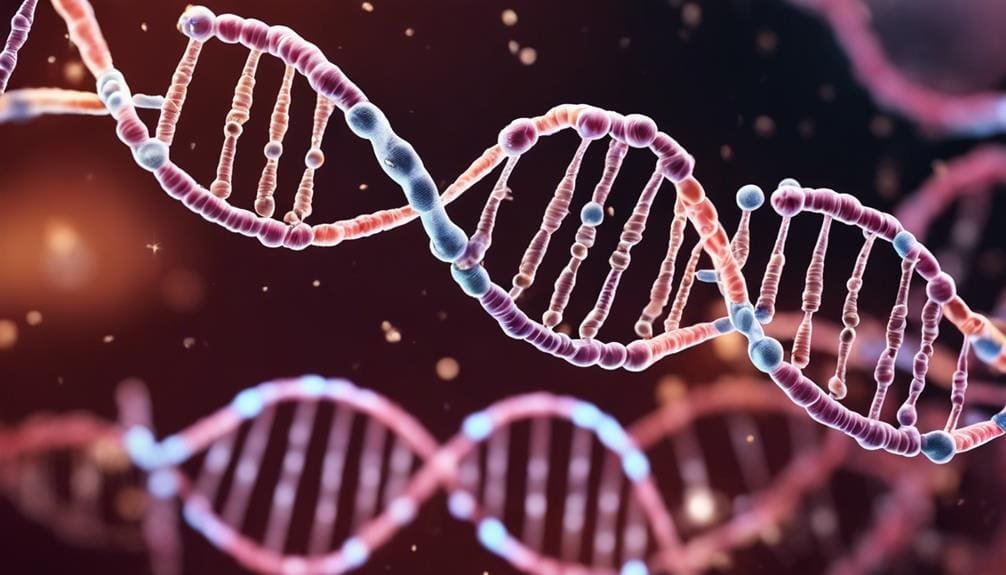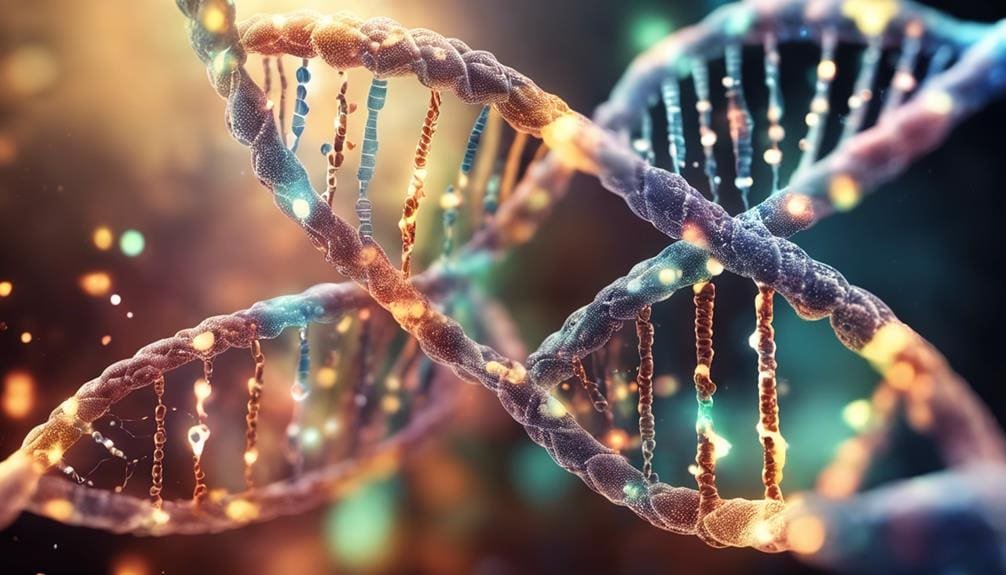When exploring the realms of nutrigenomics and epigenetics, one can observe the intricate dance between our genetic makeup and external influences.
The subtle nuances between these fields shed light on how our dietary choices and lifestyle factors can impact our genes in profound ways.
As we unravel the distinctions between nutrigenomics and epigenetics, a deeper understanding emerges, paving the way for personalized health interventions and tailored strategies that hold the key to optimizing our well-being.
Definition and Scope
In our exploration of the field of nutrigenomics versus epigenetics, it's vital to begin by defining and delineating the scope of these two distinct yet interconnected disciplines. Nutrigenomics focuses on the interaction between nutrients and genes, specifically studying how dietary factors influence gene expression. On the other hand, epigenetics deals with heritable changes in gene expression that don't involve alterations in the DNA sequence. This field explores how environmental factors impact genetic regulation.
Nutrigenomics delves into how dietary choices can influence gene activity, whereas epigenetics examines modifications that can be influenced by various factors such as diet, lifestyle choices, and aging. DNA methylation patterns play a crucial role in both disciplines. Nutrigenomics looks at the effects of nutrients on gene expression patterns, while epigenetics studies modifications that can be influenced by lifestyle choices and genetic variants.
Understanding the distinction between nutrigenomics and epigenetics is essential for comprehending how nutrition and environmental factors interact with genetic information in shaping health outcomes. Both fields play a significant role in unraveling the complex interplay between genes, dietary components, environmental exposures, and overall health status. By studying gene-nutrient interactions and genetic regulation, researchers aim to uncover personalized approaches to optimize health through a better understanding of the intricate mechanisms at play.
Genetic Influence: Diet Vs. Environment

Moving from the distinction between nutrigenomics and epigenetics, the focus now shifts to understanding the genetic influence on individuals concerning diet versus environmental factors. Genetic influence in nutrigenomics delves into how individual genetic variations impact responses to nutrients and dietary components. On the other hand, epigenetics explores how environmental factors and lifestyle choices can alter gene expression without changing the DNA sequence.
- Nutrigenomics studies the intricate interplay between genetic predispositions and dietary factors in determining an individual's nutritional requirements and reactions.
- Epigenetic changes are reversible through lifestyle modifications, contrasting with genetic variations in nutrigenomics that necessitate tailored dietary interventions.
- The distinction between nutrigenomics and epigenetics is essential for devising personalized nutrition plans that consider both genetic and environmental influences.
- Individuals with specific genetic variants may respond differently to various dietary components, highlighting the significance of personalized nutrition based on genetic makeup.
Understanding the genetic influence on individuals in terms of diet versus environmental factors is pivotal for guiding personalized nutritional interventions that cater to an individual's unique genetic predispositions and lifestyle choices. By acknowledging the role of genetics in shaping responses to diet and environmental stimuli, tailored dietary recommendations can be developed to optimize health outcomes based on an individual's genetic profile.
Mechanisms of Action

Exploring the intricate mechanisms of action in nutrigenomics and epigenetics reveals the fundamental processes underlying how nutrients, genes, and environmental factors interact to influence gene expression and ultimately impact individual health outcomes. Nutrigenomics primarily focuses on the interplay between nutrients and genetic regulation, whereas epigenetics delves into the effects of lifestyle factors and environmental exposures on gene expression patterns. Both fields play a crucial role in understanding how dietary changes, genetic variation, and epigenetic effects contribute to personalized nutrition and health outcomes.
| Mechanisms of Action | Description |
|---|---|
| Epigenetic Modifications | Changes in gene expression that occur without alterations in the DNA sequence, influenced by lifestyle factors and environmental exposures. |
| Gene Expression Regulation | The process by which genes are turned on or off, affected by dietary components, metabolic pathways, and genetic variation. |
| Personalized Nutrition | Tailoring dietary interventions based on individual genetic variations and epigenetic effects for optimal health outcomes. |
The mechanisms underlying nutrigenomics and epigenetics elucidate how these fields impact health at a molecular level. Understanding these intricate processes is essential for developing targeted strategies that consider an individual's genetic makeup, lifestyle choices, and environmental influences to promote overall well-being.
Health Implications

What implications do the intricate mechanisms of nutrigenomics and epigenetics have on individual health outcomes? When considering the impact of gene expression, dietary changes, genetic regulation, and epigenetic mechanisms on health, several key points emerge:
- Personalized Nutrition: Nutrigenomics offers the potential for personalized nutrition plans based on an individual's genetic makeup. By understanding how specific nutrients interact with genes, tailored dietary recommendations can be made to optimize health outcomes.
- Metabolic Health: Both nutrigenomics and epigenetics play crucial roles in metabolic health. Dietary changes can influence gene expression related to metabolism, impacting how the body processes nutrients and maintains energy balance.
- Lifestyle Factors: Epigenetic mechanisms highlight the influence of lifestyle choices on gene function. Factors such as exercise, stress management, and sleep patterns can impact gene expression patterns, ultimately affecting overall health.
- Environmental Influence: Environmental factors can interact with genetic regulation to influence health outcomes. Epigenetic modifications due to environmental exposures can alter gene expression, potentially leading to various health implications.
Understanding the complex interplay between gene function, dietary choices, lifestyle factors, and environmental influences is essential for promoting optimal health through personalized nutrition strategies and targeted interventions.
Research and Applications

Our exploration of the current subtopic on Research and Applications delves into the cutting-edge studies and practical implications of nutrigenomics and epigenetics in shaping personalized nutrition interventions and preventive healthcare strategies. Nutrigenomics focuses on how dietary components influence gene expression and metabolism, studying individual genetic variations to understand responses to nutrients. Epigenetics, on the other hand, investigates heritable changes in gene expression caused by environmental factors without altering the DNA sequence.
Research in nutrigenomics and epigenetics is illuminating the intricate mechanisms of gene-nutrient interactions and epigenetic processes. This knowledge is crucial for developing personalized nutrition plans tailored to an individual's genetic makeup and lifestyle. By understanding how genetic regulation is influenced by dietary changes and environmental factors, healthcare professionals can design targeted interventions to promote health and prevent disease.
Both nutrigenomics and epigenetics offer valuable insights into how lifestyle choices and dietary habits can impact gene expression, ultimately affecting health outcomes and disease susceptibility. By unraveling the complexities of genetic factors and epigenetic mechanisms, researchers can pave the way for innovative preventive strategies and personalized healthcare approaches that cater to individual genetic profiles and environmental influences.
Frequently Asked Questions
Can Nutrigenomics and Epigenetics Be Used to Predict an Individual's Risk for Developing Certain Diseases?
Yes, genetic testing through nutrigenomics and epigenetics can predict disease risk. Personalized nutrition based on genetic variations and environmental factors allows for precise disease prediction, prevention, and health outcomes through tailored nutritional interventions and risk assessment.
How Do Lifestyle Factors, Such as Stress and Physical Activity, Interact With Nutrigenomics and Epigenetics to Influence Health Outcomes?
Stress management and exercise benefits influence gene expression through genetic variations and nutrient interactions. Lifestyle choices and environmental factors impact health implications by regulating gene expression. Personalized diets can aid in disease prevention by optimizing gene expression.
Are There Specific Dietary or Lifestyle Recommendations That Can Optimize the Effects of Nutrigenomics and Epigenetics on Health?
To optimize the effects of nutrigenomics and epigenetics on health, personalized dietary interventions, lifestyle modifications, and monitoring genetic variations are crucial. By understanding nutrient interactions, gene expression, and environmental influences, we can enhance disease prevention and improve overall well-being.
Are There Any Ethical Considerations Surrounding the Use of Nutrigenomics and Epigenetics in Personalized Nutrition and Medicine?
Ethical implications in using nutrigenomics and epigenetics for personalized nutrition and medicine include privacy concerns, informed consent, equity issues, and the need for clear communication. Genetic testing must adhere to strict ethical guidelines for transparency and trust.
How Do Nutrigenomics and Epigenetics Interact With Other Areas of Personalized Medicine, Such as Pharmacogenomics, to Improve Healthcare Outcomes?
Incorporating drug interactions, genetic testing, precision medicine, disease prevention, nutritional genomics, personalized diets, environmental factors, health outcomes, genetic variations, and clinical trials, we explore how nutrigenomics, epigenetics, and pharmacogenomics synergize to optimize personalized healthcare outcomes.
Conclusion
In conclusion, nutrigenomics and epigenetics offer valuable insights into the intricate relationship between nutrition, genetics, and gene expression.
One intriguing statistic to consider is that up to 80% of chronic diseases can be influenced by lifestyle and dietary factors, highlighting the significant impact of personalized nutrition and lifestyle choices on our health outcomes.
By understanding these fields, we can make informed decisions to optimize our genetic potential and promote overall well-being.
